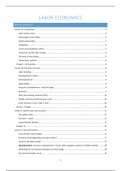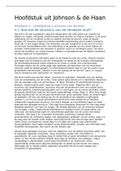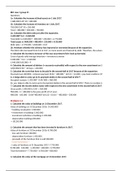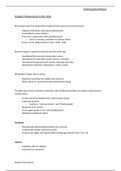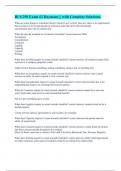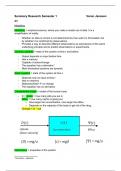Introduction & Key concepts of EU Competition
Chapter 1: The context of European competition law
General
o EU competition law consists of European legislation aimed at protecting fair
competition between undertakings in the internal market of the EU. To guarantee
this result, EU competition law is comprised of rules to avoid that free competition
is altered or reduced by undertakings restrictive practices to the detriment of
consumers.
o EU competition law includes the following provisions
Article 101 TFEU dealing with the prohibition of cartels and anti –
competitive agreements;
Article 102 TFEU dealing with the abuse of a dominant position;
Article 107 TFEU concerning State Aid
The European Commission and the national competition authorities (NCA’s)
can enforce EU Competition rules
Themes
o Preventing restrictive agreements between firms (cartel prohibition)
o Preventing the anti-competitive consequences of the exercise of substantial market
power (prohibition of abuse of dominant position)
o Preventing mergers or acquisitions which lead to concentrations in market power
with anti-competitive consequences (concentration control)
o State aid (competition rules addressed to the states)
o Preventing companies operating on the free market set up practices leading to
hampering or even blocking this free market/ensuring unrestricted and fair
competition
What is competition (law) about?
o In order to grasp what the concept of competition entails, various schools of
thoughts should be explored. As the cradle of competition law is in the United States,
the first view to be discussed is developed in this jurisdiction.
o Schools of thoughts - United States
Harvard School structure-Conduct-Performance (S-C-P) paradigm implies
that market performance is dependent on the conduct of sellers and buyers,
which in its turn is determined by the structure of the relevant market. The
US antitrust laws should be focused on the market set-up, rather than on
protecting competitors. It favors interventionist policies and the consequence
is that it could restrict innovation.
Chicago School the point of departure of this theory is that firms behave
in a rational manner and therefore seek the maximize their profits. A very
important feature of the Chicago school is the trust placed in the efficient
functioning of the markets and therefore efficiency is at the heart of this
school of thought. The focus is on efficiency, so high output and low prices.
The pursuit of efficiency should be the sole goal of competition law and
antitrust authorities must refrain from intervening on the market whenever
possible. It has confidence in the fact that entry of new firms in the market
will solve almost all market problems, an approach which stands in sharp
contrast with the Harvard school, which feared that on highly concentrated
markets entry of newcomers was very problematic.
, Behavioral economists these scholars questioned whether as a rule
companies and consumers are well informed and act in a rational way,
doubts which made these scholars introduce the concept of bounded
rationality.
New-Brandeis school reaction to the economic efficiency and consumer
welfare approach. More interventionist. Linking markets and democracy
o School of thoughts- Europe
Ordo liberalism competitive markets are based on economic freedom and
legally protected individual rights. The role of competition law is to protect
competition as a system within which individuals are free to make their own
choices. Protect competition as a system: only rules of the game and then
step back. The enforcement of competition law is entrusted to an
independent authority. This theory has had an influence on current EU
Competition law.
Current EU competition law ‘more-economic’ approach (economic
efficiency) and fair competition law which is influenced by multiple theories
(p.40)
There is no leading theory, one can argue that competition law is about free
markets and the competitive process that must be preserved.
Challenges ahead
o Digital market: big data plays an important role in many current commercial
practices, as many companies adopts business models based on personal data as key
input.
o Green deal: updating the view on how the competitive process should be shaped
looking to trump global warming.
The role of law in competition
o Competition rules are needed in order to oblige companies to not jeopardize this
process. The task of competition law is to prevent companies operating on the free
market set up practices leading to hampering or even blocking this free market.
o Competition law is not only a means for achieving various objectives, but also it
grants rights to undertakings, consumers and other stakeholders.
Objectives of competition law
o Consumer welfare
The welfare of consumers must be maximized by stimulating efficient
markets.
It must be pointed out that in this respect EU competition law is influenced
by US antitrust law where it commonly held that the protection of consumer
welfare is the ultimate purpose of antitrust law.
Consumer welfare is not the sole objective pursued in EU competition law,
unlike in US antitrust law.
o Internal market
In EU law the establishment of the Internal Market is the ultimate objective.
Even if consumer welfare is not at stake, business practices being contrary to
the Single Market imperative are condemned in EU competition law.
The provisions on free movement pursue the establishment and proper
functioning of the Internal Market.
o Ensure the structure of the market and the competition process
, EU competition law aims to protect not only the interests of competitors or
of consumers, but also the structure of the market and, in doing so,
competition as such. The well functioning of competitive markets is regarded
as an important value.
This reflects the ordoliberalism view, which emphasized the importance of
economic freedom and competition as a system.
Also in the S-C-P paradigm, the structure of the market plays an essential
role.
o Debates
The ambiguous wording of what competition law is about does not only lead
to debates, but also enables the competent authorities to incorporate new
developments in this area of law. Its flexibility allows for responding aptly to
new challenges (societal welfare, Green Deal, Corona crisis and the Digital
market). Accordingly, it cannot be excluded that new goals will be articulated
in EU competition law.
An aim of competition law is to ensure equal opportunities for companies,
consumers and other stakeholders, in the sense that these entities are free to
pursue their goals on the market as they see fit, without having any
disadvantages in comparison with others.
An important debate is to what extent public interest goals, such as
environmental protection and healthcare objectives should be
accommodated in the application of the competition rules.
A strict view is that competition law is not suitable for taking such objectives
into account, while a more flexible view will emphasize that integrating these
objectives in competition law does not affect the fundamental features of
this area of law.
It is an educated guess that competition authorities and judicial bodies will
accept that some public interest objectives must be taken into account in
competition law.
The institutional setup – EU level
o European Commission (COM) - applies and enforces EU competition rules
The task to apply and to enforce the EU competition rules is assigned to the
Commission. The Commission has its disposal far-reaching powers to fulfil
this task. The Commissioner does not adopt decisions on her own, as all
decisions are taken by the entire Commission.
The rule of law must be respected in EU law, as stipulated in article 2 TEU. For
that reason the decisions taken by the Commission, also in the field of
competition law, are subject to judicial review of the EU courts.
o General Court (GC) – handles the cases brought against the Commission’s decisions
Art. 263 TFEU stipulates that Commission decisions may be annulled by the
EU courts and that an action may be brought by any natural and legal person,
if the Commission decision is addressed to such a person or when the
decision is of direct and individual concern to that person.
Art. 261 TFEU stipulates that these courts have unlimited jurisdiction with
regard to fines and penalties imposed by the Commission
CJEU – The higher appeal to the CJEU may only concern points of law and
should not question the establishment of the facts by the GC.
o The institutional setup – Member State level
, National Competition Authorities (NCA’s) – Autoriteit Consument & Markt -
apply and enforce domestic competition rules but also EU competition law
Domestic courts - judicial review NCA’s decisions, may pose preliminary
questions to CJEU. Also, private enforcement of competition law
European Competition Network (ECN) – The Commission and the NCAs work
together in the European Competition Network wherein they apply the EU
competition rules in close cooperation.
International Competition Network (ICN) – Also at the global level such a
network as the ECN is established.
The decentralization process of EU competition law has resulted in European
and national law being closely intertwined in this policy field. However, EU
law takes precedence over national law. The CJEU accepted that European
and national competition law may be applied in parallel even if this leads to
the imposition of sanctions by both the Commission and an NCA. The reason
for this finding is that the systems of European and national competition law
pursue different objectives, that is, preserving competition on the Internal
market and addressing competition problems on the national market.
Chapter 1: The context of European competition law
General
o EU competition law consists of European legislation aimed at protecting fair
competition between undertakings in the internal market of the EU. To guarantee
this result, EU competition law is comprised of rules to avoid that free competition
is altered or reduced by undertakings restrictive practices to the detriment of
consumers.
o EU competition law includes the following provisions
Article 101 TFEU dealing with the prohibition of cartels and anti –
competitive agreements;
Article 102 TFEU dealing with the abuse of a dominant position;
Article 107 TFEU concerning State Aid
The European Commission and the national competition authorities (NCA’s)
can enforce EU Competition rules
Themes
o Preventing restrictive agreements between firms (cartel prohibition)
o Preventing the anti-competitive consequences of the exercise of substantial market
power (prohibition of abuse of dominant position)
o Preventing mergers or acquisitions which lead to concentrations in market power
with anti-competitive consequences (concentration control)
o State aid (competition rules addressed to the states)
o Preventing companies operating on the free market set up practices leading to
hampering or even blocking this free market/ensuring unrestricted and fair
competition
What is competition (law) about?
o In order to grasp what the concept of competition entails, various schools of
thoughts should be explored. As the cradle of competition law is in the United States,
the first view to be discussed is developed in this jurisdiction.
o Schools of thoughts - United States
Harvard School structure-Conduct-Performance (S-C-P) paradigm implies
that market performance is dependent on the conduct of sellers and buyers,
which in its turn is determined by the structure of the relevant market. The
US antitrust laws should be focused on the market set-up, rather than on
protecting competitors. It favors interventionist policies and the consequence
is that it could restrict innovation.
Chicago School the point of departure of this theory is that firms behave
in a rational manner and therefore seek the maximize their profits. A very
important feature of the Chicago school is the trust placed in the efficient
functioning of the markets and therefore efficiency is at the heart of this
school of thought. The focus is on efficiency, so high output and low prices.
The pursuit of efficiency should be the sole goal of competition law and
antitrust authorities must refrain from intervening on the market whenever
possible. It has confidence in the fact that entry of new firms in the market
will solve almost all market problems, an approach which stands in sharp
contrast with the Harvard school, which feared that on highly concentrated
markets entry of newcomers was very problematic.
, Behavioral economists these scholars questioned whether as a rule
companies and consumers are well informed and act in a rational way,
doubts which made these scholars introduce the concept of bounded
rationality.
New-Brandeis school reaction to the economic efficiency and consumer
welfare approach. More interventionist. Linking markets and democracy
o School of thoughts- Europe
Ordo liberalism competitive markets are based on economic freedom and
legally protected individual rights. The role of competition law is to protect
competition as a system within which individuals are free to make their own
choices. Protect competition as a system: only rules of the game and then
step back. The enforcement of competition law is entrusted to an
independent authority. This theory has had an influence on current EU
Competition law.
Current EU competition law ‘more-economic’ approach (economic
efficiency) and fair competition law which is influenced by multiple theories
(p.40)
There is no leading theory, one can argue that competition law is about free
markets and the competitive process that must be preserved.
Challenges ahead
o Digital market: big data plays an important role in many current commercial
practices, as many companies adopts business models based on personal data as key
input.
o Green deal: updating the view on how the competitive process should be shaped
looking to trump global warming.
The role of law in competition
o Competition rules are needed in order to oblige companies to not jeopardize this
process. The task of competition law is to prevent companies operating on the free
market set up practices leading to hampering or even blocking this free market.
o Competition law is not only a means for achieving various objectives, but also it
grants rights to undertakings, consumers and other stakeholders.
Objectives of competition law
o Consumer welfare
The welfare of consumers must be maximized by stimulating efficient
markets.
It must be pointed out that in this respect EU competition law is influenced
by US antitrust law where it commonly held that the protection of consumer
welfare is the ultimate purpose of antitrust law.
Consumer welfare is not the sole objective pursued in EU competition law,
unlike in US antitrust law.
o Internal market
In EU law the establishment of the Internal Market is the ultimate objective.
Even if consumer welfare is not at stake, business practices being contrary to
the Single Market imperative are condemned in EU competition law.
The provisions on free movement pursue the establishment and proper
functioning of the Internal Market.
o Ensure the structure of the market and the competition process
, EU competition law aims to protect not only the interests of competitors or
of consumers, but also the structure of the market and, in doing so,
competition as such. The well functioning of competitive markets is regarded
as an important value.
This reflects the ordoliberalism view, which emphasized the importance of
economic freedom and competition as a system.
Also in the S-C-P paradigm, the structure of the market plays an essential
role.
o Debates
The ambiguous wording of what competition law is about does not only lead
to debates, but also enables the competent authorities to incorporate new
developments in this area of law. Its flexibility allows for responding aptly to
new challenges (societal welfare, Green Deal, Corona crisis and the Digital
market). Accordingly, it cannot be excluded that new goals will be articulated
in EU competition law.
An aim of competition law is to ensure equal opportunities for companies,
consumers and other stakeholders, in the sense that these entities are free to
pursue their goals on the market as they see fit, without having any
disadvantages in comparison with others.
An important debate is to what extent public interest goals, such as
environmental protection and healthcare objectives should be
accommodated in the application of the competition rules.
A strict view is that competition law is not suitable for taking such objectives
into account, while a more flexible view will emphasize that integrating these
objectives in competition law does not affect the fundamental features of
this area of law.
It is an educated guess that competition authorities and judicial bodies will
accept that some public interest objectives must be taken into account in
competition law.
The institutional setup – EU level
o European Commission (COM) - applies and enforces EU competition rules
The task to apply and to enforce the EU competition rules is assigned to the
Commission. The Commission has its disposal far-reaching powers to fulfil
this task. The Commissioner does not adopt decisions on her own, as all
decisions are taken by the entire Commission.
The rule of law must be respected in EU law, as stipulated in article 2 TEU. For
that reason the decisions taken by the Commission, also in the field of
competition law, are subject to judicial review of the EU courts.
o General Court (GC) – handles the cases brought against the Commission’s decisions
Art. 263 TFEU stipulates that Commission decisions may be annulled by the
EU courts and that an action may be brought by any natural and legal person,
if the Commission decision is addressed to such a person or when the
decision is of direct and individual concern to that person.
Art. 261 TFEU stipulates that these courts have unlimited jurisdiction with
regard to fines and penalties imposed by the Commission
CJEU – The higher appeal to the CJEU may only concern points of law and
should not question the establishment of the facts by the GC.
o The institutional setup – Member State level
, National Competition Authorities (NCA’s) – Autoriteit Consument & Markt -
apply and enforce domestic competition rules but also EU competition law
Domestic courts - judicial review NCA’s decisions, may pose preliminary
questions to CJEU. Also, private enforcement of competition law
European Competition Network (ECN) – The Commission and the NCAs work
together in the European Competition Network wherein they apply the EU
competition rules in close cooperation.
International Competition Network (ICN) – Also at the global level such a
network as the ECN is established.
The decentralization process of EU competition law has resulted in European
and national law being closely intertwined in this policy field. However, EU
law takes precedence over national law. The CJEU accepted that European
and national competition law may be applied in parallel even if this leads to
the imposition of sanctions by both the Commission and an NCA. The reason
for this finding is that the systems of European and national competition law
pursue different objectives, that is, preserving competition on the Internal
market and addressing competition problems on the national market.



